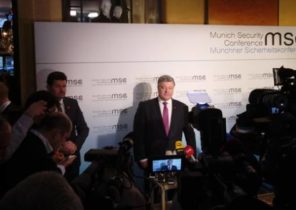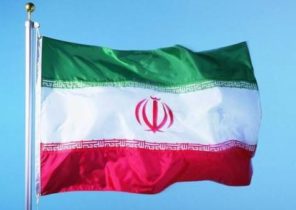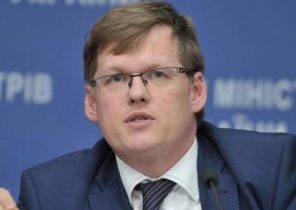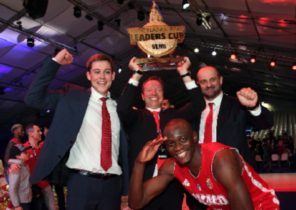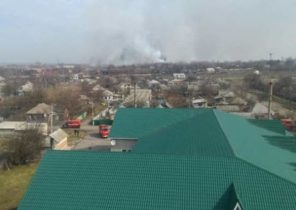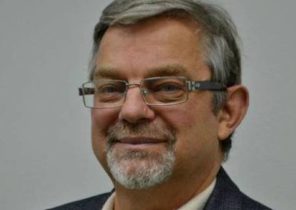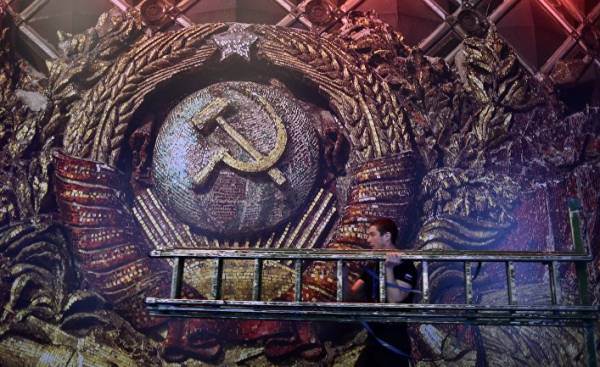
The other day at home I got the book that I missed. It’s called “Russia. Face torn country”. The name might not sound very original, but the content fits the theme. The book tells the story of Russia, as it was a quarter century ago: a kind of madhouse. Just about the time the Soviet Union collapsed, the hope for a new beginning almost immediately dried up. Former officials and cunning businessmen broke the legacy of the Soviet state and enjoyed his sudden wealth, but the majority of Russians are impoverished. Grandmother in any weather was on the “flea market”, flea markets, and sold their wedding sets. Stood next to the students and praised their lovingly collected albums with stamps. On the outskirts of the Empire, meanwhile, was at war.
What is then a Russia, where it’s headed politically and how to resolve conflicts in 1992 could not explain nor politicians, nor ordinary Russians. And we, journalists, of course.
All this is history today, in General, things in Russia are going well. The book I wrote, it includes portraits of 18 people who were looking for a place in the new Russia. They were typical for critical period: politicians and generals, businessmen and artists, idealists, populists, criminals.
Some of them are no longer alive, someone was murdered, the other left Russia or joined the government. Looking today at these portraits and see why some of them were thrown from the track, and the other built a career. And by what means Russia is back on its feet.
One of the heroes of the book — Dzhokhar Dudayev, who in 1991 declared the independence of Chechnya from Russia and called on the peoples of the Caucasus to resist “Moscow colonists.” In his opinion, Russia sparked a war, sent 60 thousand soldiers in a small Republic. Three months after my conversation with President of Chechnya, his residence, where we met, was erased from the face of the earth, even after 15 months, the Russian rocket took his life, 15 years in Chechnya, the reign of peace. Presumably, this war was worth 160 thousand lives. Since then, Russia has no more aspirations for secession.
Another hero of this book was a biochemist and dermatologist Sergei Debov, he too is now dead. In 1952 Debow joined the secret team “Lenin’s Mausoleum”, a group of scientists who since 1924 embalmed in Moscow lying in the coffin, the leader of the revolution. Almost 40 years Debow, which were embalmed and Stalin, the secret solution to refresh the body of Lenin, and so twice a week.
Then the Soviet Union and communism collapsed. President Boris Yeltsin cut off funding for the secret team and took the guard of honor in front of the mausoleum. Lenin became the scapegoat of the nation, the civil initiative advocated for his burial at the St. Petersburg cemetery. Tebow, by contrast, seemed shocked: “cross out Lenin from the history of Russia — so will not go.”
The fact that the leader of the revolution 25 years later are still on display in red square and successors Debowa continue its work, also explains why Russia has found a path to stability. The leader of the October revolution, which was the same as Stalin, no matter how many of his countrymen have fallen victims of Communist ideas, remains an important political symbol. His continuing demonstration calms supporters of the Communists, and illustrates the conviction of the Kremlin leadership that Russia’s history is nothing to be sorry about. It is a kind of connecting link to understanding the history of the country, Vladimir Putin.
The third hero of the book is still alive, he is now 53 years old. He was born on the day of Stalin’s birth, rose to Vice-Prime Minister and today is responsible for the military industry. I met with Dmitry Rogozin, when he was 31 years old, shortly before he entered to the personnel reserve of the state youth Union (Komsomol). He later became Ambassador to NATO and shocked Western military familiar with it; we often met in Brussels.
After the collapse of the Soviet Union, Rogozin has taken responsibility for the fate of the 25 million Russians who now lived outside the country in other former Soviet republics. He founded the “Congress of Russian communities” to protect their interests, and became the ideological leader of the “Russian world”. The world, according to Putin, today we need to defend all corners of the globe, where Russian compatriots live. Since then Rogozin has become a kind of nationalist speaker of the government, just these days he again called Western politicians “parasites”.
The return of Chechnya, rehabilitation of Soviet history and memories of his own, the Russian world — similar to the current actions of Donald trump in the US under the slogan “America first” (“first of America”) — all this contributed to saving the young Russian. The Russians are grateful to Putin, this is manifested in the support of more than 80% of voters.
In Russia a lot to see. A few weeks ago, I was in the town of Gvardeysk in the North-West of Russia, there are only 13 thousand inhabitants. The last time I was there in 1998, after the big collapse of the ruble, which almost brought the state to bankruptcy. Then closed a paper mill, then the plant for the production of concrete, then the cheese factory. The heat was no more coal, three quarters of the residents were below the poverty line.
Even in the hospital was cold, lacked medicines and gloves for surgeons. In army barracks and prison, located in an old fortress, the food was in short supply. In the villages under the guards malnutrition and contaminated drinking water has led to cases of tuberculosis and meningitis.
Today, in 2017, the house on the market square svezheokrashennym, opened a furniture factory, a slaughterhouse and a plant for the production of packaging material, there is a youth club and a fitness Studio. And from prison in the fortress will make a tourist place.
Of course, if you go East, deep into the province, you can see a very different picture, they killed whole villages. But a national disaster, which paralyzed Russia two decades ago is nothing like. And especially in Moscow, which has become a modern metropolis with pedestrian areas, large supermarkets, jazz clubs and avant-garde theatres, with Wi-Fi on the streets and even underground in the subway.
And yet there is something that over the last 25 years has not changed neither in the capital nor in the rest of the country. I ran into this when recently I read the Bulletin Board at the entrance to my Moscow house. This explains the phenomenon that accompanies Russia for centuries, and once again explains 80% support Putin.
Ad is dedicated to the message of the Moscow government about a plan to demolish approximately 4.5 thousand of the old houses. We are talking about a five-storey ugly and often damaged prefabricated buildings, this applies to about one million Muscovites, about the twelfth part of the population of the city. However, the mayor so cavalierly embarked on this plan in the blink of an eye, dragging the relevant law through the Duma that has raised a storm of indignation. Even in my area where such homes do not exist.
In the ad at my house reported about the initiative of the “Muscovites against demolition.” In their opinion, the project is a nefarious act on forced resettlement. It is not only about old panel buildings, but also about how to throw close to the government to construction companies plots of land for construction of more profitable high-rise buildings. Residents who refuse to move would be resettled by force, without any compensation for the fact that the tenants invested in repairs, many would never be able to get something equivalent to their privatized apartment.
Outrage in Moscow is enormous. The government, declared that he wants to help people, was struck by an unexpected resistance. Even Putin was forced to intervene and encourage the Duma to make minor changes to the law, because in the 2018 presidential elections will be held, and he doesn’t need the protests of angry citizens.
As often happens in Russia: even if the user promises to do in principle something good for the people, in the process of implementation is usually distorted. Because it takes individual decisions and presents them to people as Christmas gift. Because it tries to implement plans in the Bolshevik manner. The fact that there might be objections, Russian politicians usually does not occur.
The debate around the relocation of residential buildings show that in the political system of Russia, as before, no feedback. The government is not troubled by the involvement of their own people. Policy is conducted by pardons or prohibitions. Therefore, resume the demonstration in Moscow and other cities of the country. The people and the state in Russia rarely meet each other.
It is a country of barriers; “normal position of gate is closed”, once told the writer Viktor Erofeev and asked: “Motherland willingly allows you to love her, but if she likes you too? Love us, Russia?” Erofeev believes that the love of Russians to Russia is not based on reciprocity, which I also repeatedly noticed over the past decade. But he thinks that Russians are to blame themselves, because they are not interested in government.
A few months ago I argued on this subject with a famous filmmaker and theater Director Andrei Konchalovsky. This month he turns 80 years old, he took some of the best Russian films and has long lived in Hollywood. Despite all the differences, in many ways we were very close. Konchalovsky said that the Russians for centuries remained essentially a peasant. He never became a citizen and was always hostile towards the state, because it is constantly it takes away something. At the same time he has such patience, it’s easier to accept injustice. Also, Russian thinking is Manichean, it only knows black and white.
And then he said that, at first, Putin thought like a Westerner. Then he realized why every Russian ruler was hard to manage this state: because of its residents, according to traditions, volunteer delegate all the power to one man only. And then they expect that this government will take care of them, and they themselves do nothing.
Therefore, the relationship of nation and state in Russia — a complete misunderstanding. Is it possible for a foreigner to say such a thing? Yeah, I’m doing Russia for more than 30 years and half of them have lived in this country. I understand why liberals Boris Yeltsin failed in the 90-ies. Liberalism in Russia there’s no chance the people would not allow it.
Strange attitude of Russians to their state can be observed in many everyday items. Two or three years ago the mayor of Moscow began to solve the Parking problem, introducing an online system of paying for Parking. Rate low, the hour is mostly less than one Euro. The situation defused, the system went all good. But what happened? Muscovites began to glue their license plates to the car, passing by, not able to scan rooms parked cars and identify violators of Parking rules.
Another example: for decades in Russia practically no new roads, not to mention the autobahns. Now, however, between Moscow and St. Petersburg built a new high-speed track, the first part leads up to Moscow Sheremetyevo airport. Only it is almost never used, because a small road toll increased. The drivers of Russia see this as Stripping the money of the state and prefer to stand in traffic on the old road.
Citizen should do something for society, to obtain from him something in return — such awareness is rarely seen in Russia. So, although the Russians appreciate his actors and poets is much higher than do the Germans, for truly creative people, their ways of trying to promote discussion about the future course of the country, they are skeptical.
Writer Boris Akunin published in Russia in the millions, but lives abroad because he hates the policy of their government. Like its counterpart Vladimir Sorokin, who has long pursued close to the government and political organizations. Has achieved international recognition the Director Kirill Serebrennikov has also come under pressure recently, police forces stormed the theater. His ballet “Nureyev” at the Bolshoi theater was cancelled three days before the premiere — he encountered fierce resistance from conservative politicians. That touched me, because I won on this evening one of hard tickets to the Bolshoi theater.
Such excesses are preventing only a little Russian, never raises protests — except for a few votes of the Moscow intelligentsia.
“We are one people, we love those who are like us, we don’t need different” — so it is sarcastically explained Viktor Yerofeyev. The Prosecutor who inspires people fear, still closer to him than reformed oligarch Mikhail Khodorkovsky, who openly criticises the Putin system.
How is it possible, I asked myself when these days were at the police station in the centre of St. Petersburg. Because it is there particularly evident, as the state tries to humiliate its citizens. The officer never even looked at those who approached him with a request. Heavy iron doors block the entrance to the offices, from time to time they were opened, following the inexplicable logic; in the offices of the protocols are still conducted by hand. And on the walls hang portraits of Felix Dzerzhinsky! It was the first head of the secret services of the Soviet Union, the man who unleashed the red terror and ordered the killing of tens of thousands of people. His monument in front of Moscow Lubyanka before the end of the Soviet Union was demolished, one of the first and the police again surreptitiously hung his portraits?
Why did the Russians accept it in silence?
Their passivity and indifference in a bad way mixed with fatalism and fear of responsibility that make it impossible for most to penetrate to the core of historical truth. Many people do not care that re-established the monuments to Stalin. Despite the fact that it’s almost like if the Jews put up a monument to Hitler, wrote one Moscow journalist.
The use of force by the state is also perceived as something metaphysical, life-changing. The vast majority of the population, as before, is unable to realize the fact that as a result of the red terror, millions of people lost their lives, says social philosopher Alexander Tsipko.
When 35-year-old resident of the Siberian Tomsk Denis Karagodin after a long investigation found out which employees of special services have declared his great-grandfather Stepan in 1938, a Japanese spy, and then to execute, he filed a lawsuit against the responsible for that, although they died long ago. He is the first citizen of Russia, who was not content with the formal decision of the authorities on the rehabilitation. He wants to bring torturers to justice, at least symbolically. But his persistence causes misunderstanding and confusion. Arguments: in any case, what has already happened doesn’t change.
What is described here was not invented by Vladimir Putin. Putin this mentality found he also take into account. An escape from personal responsibility? Isolation of dissidents? The resignation? A sense of inferiority in relation to the rest of the world? This quality, which the state must deal. Instead, it strengthens them, because it is profitable. In recent years, even among Russian friends me with anxiety is evident that most of them succumbed to the demagoguery of the President.
Putin is fueling the Russians have a sense of disdain for the Ukrainians, though — I’m sure — the Russians are deep down jealous that Ukrainians are now able to get closer to Europe. And it supports in the population a sense of moral and military superiority of the West, which has little to do with reality, while the state and the masses, increasingly isolated from the outside world. Putin turns Russia into the dissident world order, and the people rejoice, like a carnival trick. At the same time Europe and America for many Russians, remains the most important guidance for his own life.
As already mentioned, all this was not invented by Putin. Putin has learned to skillfully play on those keys and use the Russian mentality with the help of demagogy, half-truths or lies. This was for me the most important realization in the 25 years since the rebirth of Russia.
Christian Neef since 1983 he worked as a correspondent in Moscow since 1991 for the publication of Der’s[iegel. He later became Deputy head of a foreign edition. The last three years, NEEP again lived and worked in Moscow. Now he is retiring.
